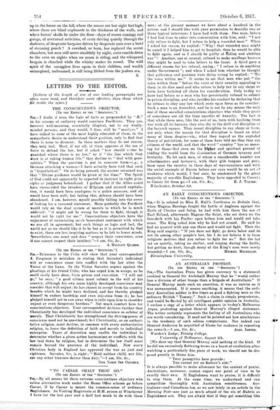SER,—lleference to the Criio will show that your correspondent A.
Ferguson is mistaken in stating that Socrates's individual will or conscience came into conflict with the law after the Wieion of the Laws. In the Vision Socrates argues against the pleadings of his friend Crito, who has urged him to escape, as he mold easily have done, from prison and execution. " I will not go," he says; "a good citizen must submit to the will of his country, although his own more highly developed conscience may consider that will unjust; lie has chosen to accept from his country benefits which. he might have declined, and has thereby pledged himself to endure hardship and even injustice from it; he has pledged himself not to run away when it calls upon him to shoulder unjust or even dangerous burdens." Not much comfort here for conscientious objectors. Your correspondent declares further that Christianity has developed the individual conscience as arbiter of n aarals. That Christianity has strengthened the driving-power of eonscience need not be questioned; but Christianity, as an authori- tative religion, must decline, in common with every authoritative religion, to leave the definition of faith and morals to individual enterprise. Years of discretion may enable the individual to determine whether a given action harmonizes or conflicts with the low laid down by religion, but to determine the law itself must remain beyond the province of the individual. Now every Christian body in England has approved the war as just and righteous. Socrates, Sir, is right "Mold neither child, nor life, nee any other treasure dearer than duty."—I am, Sir, Ac., Nor Norm Sin °WOKS.




























 Previous page
Previous page